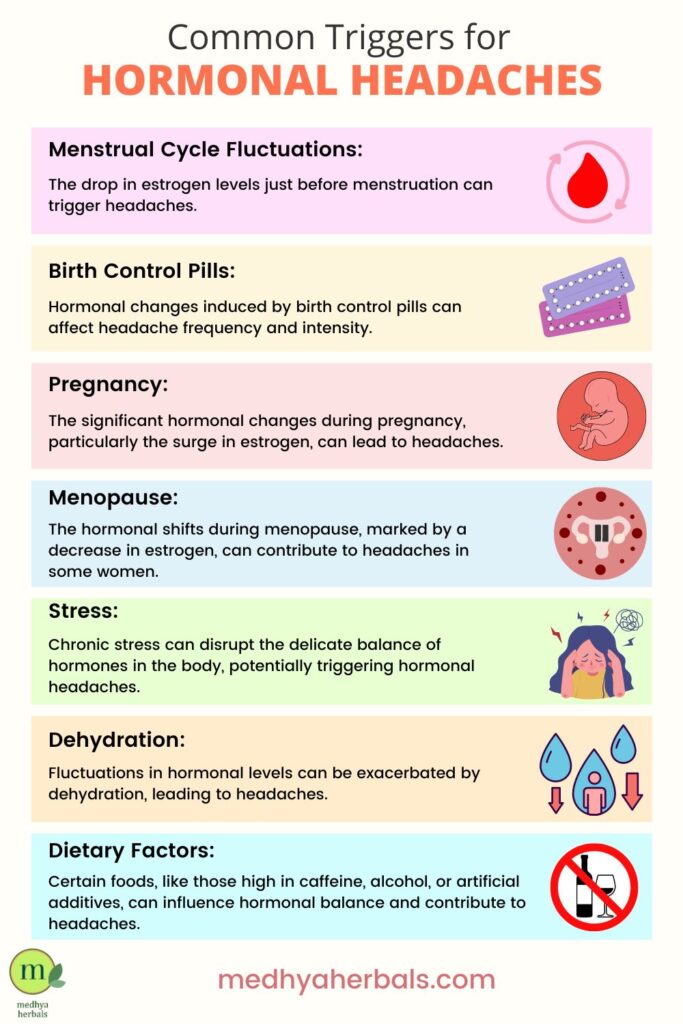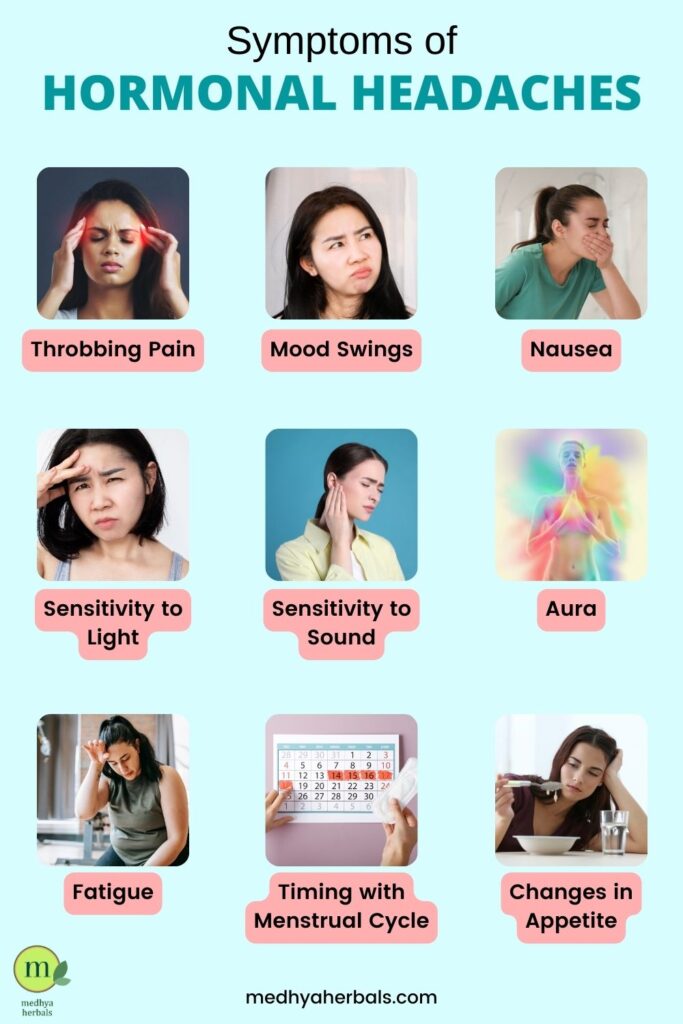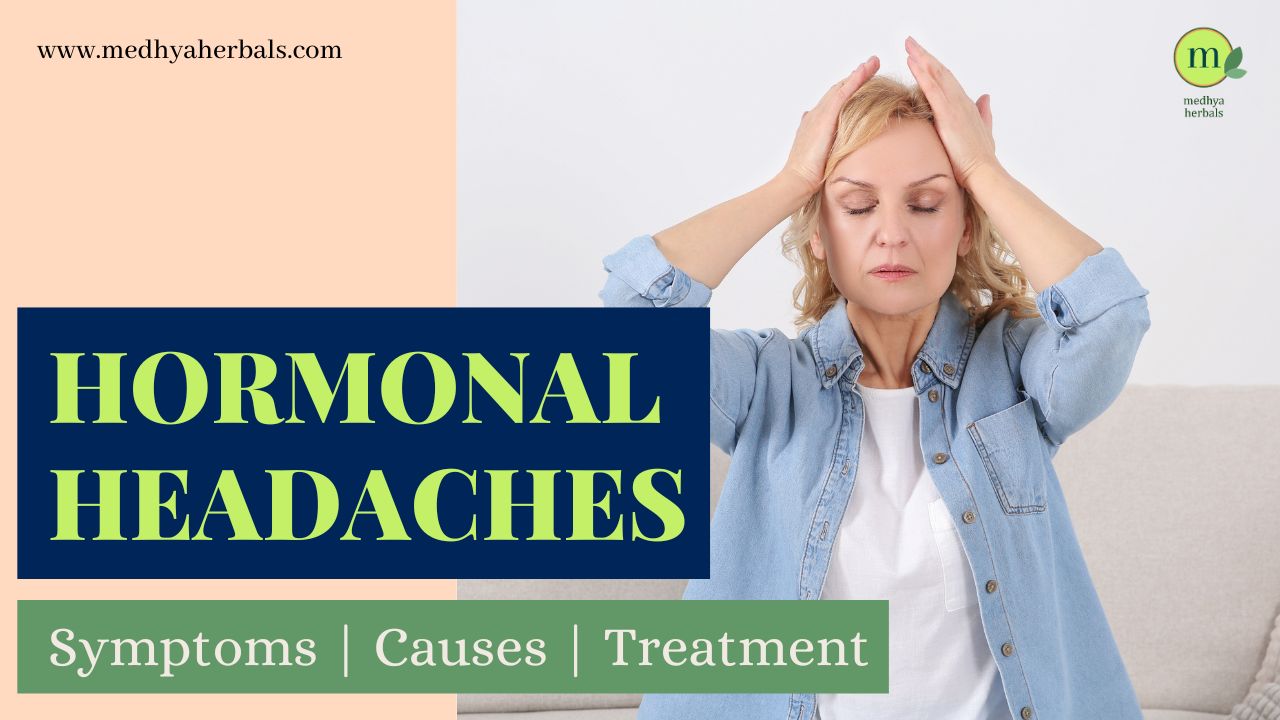Do you ever wake up to a throbbing pain in your head, right around the time your period is due? Or maybe you experience intense headaches that coincide with hormonal fluctuations throughout your cycle? If so, you’re not alone. Millions of women around the world suffer from hormonal headaches, also known as menstrual migraines or period headaches. These headaches can be debilitating, affecting daily activities and impacting quality of life. But did you know there are natural ways to manage and even prevent these headaches?
In this blog post, we’ll delve into the world of hormonal headaches and explore effective Ayurvedic solutions to help you find lasting relief. We’ll explore the science behind these headaches, their connection to your menstrual cycle, and the power of Ayurveda in restoring hormonal balance. By the end, you’ll be equipped with valuable knowledge and practical tips to navigate hormonal headaches and regain control of your well-being.
Understanding Period Headaches
The link between fluctuating hormone levels, particularly estrogen, and hormonal headaches is intricate and often tied to the complex interplay of hormones within a woman’s body. Estrogen, a key female sex hormone, plays a vital role in regulating various physiological processes, including the menstrual cycle. When estrogen levels fluctuate, it can impact the blood vessels, neurotransmitters, and overall neurological function, contributing to the onset of headaches.
Link between Fluctuating Hormone Levels and Hormonal Headaches
- Estrogen and Blood Vessels: Estrogen has a vasodilatory effect, meaning it relaxes and widens blood vessels. Fluctuations in estrogen levels, such as the drop before menstruation, can lead to blood vessels constricting and dilating irregularly, triggering headaches.
- Serotonin Levels: Estrogen influences the levels of neurotransmitters, including serotonin, in the brain. Changes in estrogen levels can disrupt serotonin balance, contributing to headaches. Serotonin is known to affect mood, appetite, and the perception of pain.
- Inflammatory Response: Estrogen has anti-inflammatory properties, and fluctuations can affect the body’s ability to manage inflammation. Inflammation is linked to headaches, and hormonal imbalances may contribute to an increased inflammatory response.
- Menstrual Migraines: Some women experience migraines specifically associated with the menstrual cycle, known as menstrual migraines. These migraines often coincide with the drop in estrogen levels just before menstruation begins.
- Estrogen Withdrawal: Hormonal headaches can occur during times of estrogen withdrawal, such as during the premenstrual phase or perimenopause. The abrupt decrease in estrogen levels may trigger headaches in susceptible individuals.
Common Triggers for Hormonal Headaches
Hormonal headaches often have specific triggers that can set off throbbing discomfort. Understanding these triggers is crucial in managing and preventing these headaches effectively. Here are some common culprits:
- Menstrual Cycle Fluctuations: For many women, hormonal headaches are closely tied to the menstrual cycle. The drop in estrogen levels just before menstruation can trigger headaches.
- Birth Control Pills: Hormonal changes induced by birth control pills can affect headache frequency and intensity. Some women may experience relief, while others may find an increase in headaches.
- Pregnancy: The significant hormonal changes during pregnancy, particularly the surge in estrogen, can lead to headaches. However, some women may experience relief during this time.
- Menopause: The hormonal shifts during menopause, marked by a decrease in estrogen, can contribute to headaches in some women.
- Stress: Chronic stress can disrupt the delicate balance of hormones in the body, potentially triggering hormonal headaches.
- Dehydration: Fluctuations in hormonal levels can be exacerbated by dehydration, leading to headaches. Staying well-hydrated is crucial in headache prevention.
- Dietary Factors: Certain foods, like those high in caffeine, alcohol, or artificial additives, can influence hormonal balance and contribute to headaches.
Recognizing these triggers allows for a more targeted approach in managing hormonal headaches. Through Ayurveda, we’ll explore how lifestyle modifications and natural remedies can help mitigate the impact of these triggers, fostering a harmonious balance within the body.

Symptoms of Hormonal Headaches
Hormonal headaches come with a distinct set of symptoms that can vary in intensity and duration. Recognizing these signs is essential for effective management. Here are the common symptoms associated with hormonal headaches:
- Throbbing Pain: The headache often presents as a pulsating or throbbing pain, typically on one side of the head.
- Timing with Menstrual Cycle: Women may notice a pattern of headaches occurring before, during, or after menstruation, indicating a hormonal connection.
- Nausea: Hormonal headaches can be accompanied by feelings of nausea or, in some cases, actual vomiting.
- Sensitivity to Light (Photophobia): Bright lights may exacerbate the pain, and individuals with hormonal headaches often prefer dim environments during an episode.
- Sensitivity to Sound (Phonophobia): Loud noises or sudden sounds can worsen the headache and discomfort.
- Aura: Some individuals may experience visual disturbances or auras before the onset of the headache, such as seeing flashing lights or zigzag patterns.
- Fatigue: Hormonal imbalances can contribute to overall fatigue, adding to the challenges of managing daily activities.
- Changes in Appetite: A fluctuation in hormonal levels may influence appetite, leading to changes in eating patterns.
- Mood Swings: Hormonal headaches can be associated with mood changes, including irritability and heightened sensitivity.
Understanding and tracking these symptoms provide valuable insights into the nature of hormonal headaches. In the upcoming sections, we’ll delve into Ayurvedic perspectives on managing these symptoms, offering a holistic approach to finding relief and restoring balance to your well-being.

Ayurvedic Herbs for Hormonal Headaches
Ayurveda, with its holistic approach to well-being, offers a range of herbs known for their potential in addressing hormonal headaches. Here are some Ayurvedic herbs that may provide relief:
- Ashwagandha (Withania somnifera): Known for its adaptogenic properties, Ashwagandha helps the body adapt to stress and may contribute to hormonal balance, reducing the frequency and intensity of headaches.
- Shatavari (Asparagus racemosus): This herb is often used to support female reproductive health. Shatavari may help regulate hormonal fluctuations and ease symptoms associated with hormonal headaches.
- Brahmi (Bacopa monnieri): Brahmi is recognized for its ability to support the nervous system. It may help alleviate stress and tension that can contribute to hormonal imbalances and headaches.
- Amla (Emblica officinalis): Rich in Vitamin C and antioxidants, Amla is known for its rejuvenating properties. It may help boost overall well-being and contribute to hormonal harmony.
- Gokshura (Tribulus terrestris): Gokshura is traditionally used in Ayurveda to support reproductive health. It may help regulate hormonal imbalances and address symptoms like headaches.
- Lavender (Lavandula): While not a traditional Ayurvedic herb, lavender is often used in Ayurvedic aromatherapy. Its calming aroma may help alleviate stress and tension associated with hormonal headaches.
- Turmeric (Curcuma longa): Known for its anti-inflammatory properties, turmeric may help reduce inflammation associated with headaches and contribute to overall well-being.
- Saraca indica (Ashoka): Ashoka is recognized in Ayurveda for its benefits in female reproductive health. It may help regulate menstrual cycles and ease symptoms related to hormonal changes.
Before incorporating these herbs into your routine, it’s advisable to consult with an Ayurvedic practitioner or healthcare professional to ensure they align with your specific needs and health conditions. Integrating these herbs alongside a balanced lifestyle and proper dietary choices can contribute to a holistic approach in managing hormonal headaches.
Ayurvedic Lifestyle tips for Hormonal Headaches
Managing hormonal headaches involves not only herbal remedies but also adopting a holistic lifestyle approach. Here are some Ayurvedic-inspired lifestyle tips to help alleviate hormonal headaches:
- Maintain a Regular Routine: Establish a consistent daily schedule, including regular wake-up and bedtime. Aim for balanced meal times to support stable blood sugar levels.
- Stay Hydrated: Adequate hydration is crucial for overall well-being and can help prevent headaches. Consume warm water throughout the day, and avoid excessive intake of caffeinated or sugary beverages.
- Prioritize Stress Management: Incorporate stress-reducing practices like meditation, deep breathing, or yoga into your daily routine. Create moments of calmness to counteract the impact of stress on hormonal balance.
- Balanced Exercise: Engage in regular, moderate exercise to support circulation and reduce tension. Choose activities like walking, swimming, or gentle yoga that align with your body’s natural rhythms.
- Nutritious Diet: Emphasize a diet rich in whole, nutrient-dense foods. Include fruits, vegetables, whole grains, and lean proteins, and minimize processed and refined foods.
- Adequate Sleep: Ensure you get sufficient, quality sleep each night. Create a relaxing bedtime routine, and consider herbal teas like chamomile or lavender for added relaxation.
- Mindful Eating: Practice mindful eating to enhance digestion and nutrient absorption. Avoid skipping meals and pay attention to how different foods affect your body.
- Avoid Environmental Toxins: Minimize exposure to environmental toxins by choosing natural cleaning and personal care products. Opt for organic produce to reduce pesticide exposure.
- Limit Stimulants: Reduce the intake of caffeine, alcohol, and tobacco, as they can contribute to hormonal imbalances and trigger headaches.
- Connect with Nature: Spend time outdoors and connect with nature. Sun exposure can help regulate circadian rhythms, promoting hormonal balance.
Remember, these lifestyle tips are complementary and work synergistically with Ayurvedic herbal remedies. It’s essential to personalize these recommendations based on your individual needs and consult with healthcare professionals or Ayurvedic practitioners for personalized guidance. Adopting a holistic approach to lifestyle can contribute to long-term well-being and help manage hormonal headaches effectively.
Yoga Poses for Hormonal Headaches
Yoga, with its focus on gentle movements, deep breathing, and relaxation, can be beneficial in managing hormonal headaches. Here are some yoga poses that may help alleviate symptoms and promote overall well-being:
- Child’s Pose (Balasana): Child’s Pose, known as Balasana in Sanskrit, offers a wealth of benefits for both body and mind. It gently stretches the back, hips, and thighs, improving flexibility and posture. This pose also promotes relaxation by calming the nervous system and reducing stress, which can further benefit sleep, digestion, and overall well-being. Additionally, Child’s Pose can be a resting pose during yoga practice, allowing you to refocus and recharge before continuing your practice.
- Downward-Facing Dog (Adho Mukha Svanasana): The Downward-Facing Dog pose, a staple in yoga, offers a multitude of benefits. It strengthens and stretches major muscle groups like the hamstrings, calves, and shoulders, while improving circulation and flexibility. Additionally, it can help alleviate back pain by lengthening the spine and decompressing the vertebrae, and may even reduce stress and anxiety by promoting deep breathing and a sense of calm.
- Cat-Cow Pose (Marjaryasana-Bitilasana): The Cat-Cow Pose, with its gentle arching and rounding of the spine, offers a multitude of benefits. It improves spinal mobility and flexibility, promotes healthy blood flow to the spine, and massages the internal organs. This gentle movement can also help ease back pain, improve posture, and even reduce stress and anxiety.
- Seated Forward Bend (Paschimottanasana): The Seated Forward Bend, also known as Paschimottanasana, offers a variety of benefits for both the body and mind. It stretches the entire back of the body, including the hamstrings, calves, spine, and shoulders. This can help to improve flexibility, posture, and circulation. Additionally, the forward bend can help to calm the mind and reduce stress.
- Bridge Pose (Setu Bandhasana): Bridge Pose, also known as Setu Bandhasana, offers a multitude of benefits for both the body and mind. It gently stretches the chest, shoulders, and abdomen, while strengthening the back muscles, glutes, thighs, and ankles. This backbend can improve posture, counteract the effects of slouching, and may help relieve lower back pain. Additionally, Bridge Pose is considered a mild inversion, bringing the heart above the head, which can improve circulation, reduce stress and anxiety, and promote feelings of calmness.
- Legs Up the Wall (Viparita Karani): The Legs Up the Wall pose, also known as Viparita Karani, offers a multitude of benefits by gently inverting your body. This pose can help reduce swelling and fatigue in the legs, promote relaxation and stress relief, gently stretch your lower back and hamstrings, improve circulation, and even aid with digestion, making it a valuable tool for both physical and mental well-being.
- Corpse Pose (Savasana): Corpse pose activates the parasympathetic nervous system, which is responsible for the body’s “rest and digest” response. This can help to lower blood pressure, reduce stress and anxiety, and improve sleep quality. Additionally, Savasana allows the body to fully integrate the benefits of the yoga practice just completed, promoting muscle recovery and mental clarity.
Remember to listen to your body and practice yoga with gentleness. Consult with a yoga instructor or healthcare professional, especially if you’re new to yoga or have any health concerns. Consistent practice of these yoga poses, along with Ayurvedic remedies and lifestyle adjustments, can contribute to managing hormonal headaches naturally.

Conclusion
In conclusion, we understand the relentless cycle of hormonal headaches and the constant search for relief. You deserve to reclaim your well-being and ditch the throbbing pain. The quest for relief can be daunting, and at Medhya Herbals, we empathize with your journey. Our commitment to your well-being extends beyond this article, and we encourage you to take the next step towards lasting relief.
Ayurveda offers a distinct approach, not just treating symptoms, but addressing the root cause of your headaches. By restoring balance within your body, it can pave the way for lasting relief. At Medhya Herbals, our experienced Ayurvedic doctors will work closely with you to understand your unique situation and create a personalized treatment plan tailored specifically for you.
Don’t let hormonal headaches rule your life any longer. Schedule a consultation with Medhya Herbals today and embark on a journey towards a headache-free future. Together, we can find the natural solution that works best for you.
FAQ
What does a hormonal headache feel like?
A hormonal headache, often experienced by women during specific phases of their menstrual cycle or hormonal changes, manifests as a pulsating or throbbing pain, typically on one side of the head. The discomfort is often accompanied by symptoms such as nausea, sensitivity to light (photophobia), and sensitivity to sound (phonophobia). These headaches, influenced by fluctuations in estrogen levels, can be more intense than regular headaches and may coincide with the menstrual cycle, pregnancy, or menopause. The pain is characterized by its cyclical nature, usually aligning with hormonal shifts, making it distinct from other types of headaches. Overall, a hormonal headache can significantly impact a woman’s well-being, influencing daily activities and highlighting the intricate connection between hormonal imbalances and physical discomfort.
What do hormonal pregnancy headaches feel like?
Hormonal pregnancy headaches can vary in sensation and intensity from person to person. Some women describe these headaches as throbbing or pulsating, often accompanied by nausea, sensitivity to light or sound, and sometimes visual disturbances. These headaches are typically caused by hormonal changes, particularly the increase in estrogen and progesterone levels during pregnancy. They can occur at any stage of pregnancy but are more common in the first and third trimesters. If you experience severe or persistent headaches during pregnancy, it’s important to consult with your healthcare provider to rule out any underlying issues and to discuss safe treatment options.
Where are hormonal headaches located?
Hormonal headaches are commonly localized, with the pain typically concentrated on one side of the head. The discomfort often manifests as a throbbing or pulsating sensation, frequently extending to the temples and causing pressure around the eyes. In some cases, individuals may experience pain that radiates from the base of the skull to the forehead. The precise location of the headache can vary among individuals and may shift throughout the course of an episode. Understanding the specific location of hormonal headaches is crucial for accurate diagnosis and targeted management strategies, as different types of headaches often present with distinct patterns of pain distribution.
Can hormonal imbalance cause headaches everyday?
While hormonal fluctuations during your cycle can certainly trigger headaches, experiencing daily headaches wouldn’t be typical of hormonal imbalances alone.
While some women might experience headaches for several days around their period due to hormonal shifts, daily headaches could indicate other underlying factors. These could range from stress and dehydration to tension headaches or even more serious conditions. If you’re experiencing daily headaches, it’s crucial to consult a healthcare professional to receive an accurate diagnosis and discuss appropriate treatment options.
What causes hormonal headache behind eye?
A hormonal headache behind the eye can be a debilitating experience, often characterized by a sharp, stabbing pain that radiates from the back of the eye to the temple. This type of headache is commonly associated with menstrual migraines or hormonal fluctuations during the menstrual cycle. The pain can be intense and throbbing, and may be accompanied by other symptoms such as nausea, vomiting, and sensitivity to light and sound. Managing hormonal headaches behind the eye may require a combination of lifestyle changes, stress management techniques, and possibly medication prescribed by a healthcare professional.
Why do I get headaches after my period?
While most hormonal headaches occur before or during your period, some women experience them after their period ends. This can be attributed to several factors:
- Lingering hormonal fluctuations: Even after your period ends, estrogen and progesterone levels may take some time to stabilize completely. These subtle fluctuations can still trigger headaches in some individuals.
- Dehydration: Periods can lead to dehydration, and replenishing lost fluids often takes time. Dehydration is a known trigger for headaches, so insufficient water intake even after your period can contribute to post-menstrual headaches.
- Iron deficiency: Heavy periods can lead to iron deficiency, which is a well-established risk factor for headaches. If your iron stores are depleted, even after your period ends, you might be more susceptible to headaches.
If you experience consistent post-menstrual headaches, it’s crucial to consult a healthcare professional to rule out any underlying medical conditions and explore personalized management strategies.
References
The complex relationship between estrogen and migraines: a scoping review: https://pubmed.ncbi.nlm.nih.gov/33691790/
Migraine in women: the role of hormones and their impact on vascular diseases: https://pubmed.ncbi.nlm.nih.gov/22367631/
Headaches and hormones: What’s the connection?: https://www.mayoclinic.org/diseases-conditions/chronic-daily-headaches/in-depth/headaches/art-20046729
What are hormonal headaches, and how can you treat them?: https://www.medicalnewstoday.com/articles/hormonal-headaches

